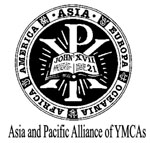|
The whole morning of the third day was group work with their respective group assignments in Youth Group, Creative Kids Team and Culture and Festival Organizing Team. Most of the local participants joined the Youth Group where overseas participants shared their experiences in forming the youth club and developing programs in their respective YMCAs. This helped the local participants get ideas on how to form youth groups in Surabaya YMCA. The group B worked with the teachers in Kindergarten to teach children some songs, painting, origami and games. Since some of the participants were Sunday school and English teachers, they had teaching experience with the children then.
Later in the day, each group prepared one performance number related to Global Citizenship Education for 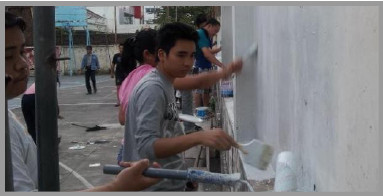 presentation during the cultural event. It was followed by another sharing and presentation from Bangladesh and Sri Lanka participants. The participants then all volunteered for the wall painting in the YMCA Surabaya compound. presentation during the cultural event. It was followed by another sharing and presentation from Bangladesh and Sri Lanka participants. The participants then all volunteered for the wall painting in the YMCA Surabaya compound.
On the last day of the work camp activities, Ms. Julia Mun Pan, the Youth Intern of APAY talked on how to make an action plan and introduced the grant proposal format of APAY. It was followed by action planning where three groups prepared their action plans including the organization and formation of their youth club in Surabaya. In the afternoon, each group presented their action plans which the APAY and the National Council have. It is expected that immediately after the work camp, follow-up will be done at the local YMCA of Surabaya to form their youth club through the guidance of the National Council of the YMCAs of Indonesia. The closing program was held in the evening. A sight-seeing in Mt. Bromo in Wonokiri village took another day.
JULIA MUN PAN
Youth Participation and Leadership Development
 After APAY International Work Camp… After APAY International Work Camp…
APAY International Work Camp in Surabaya is a unique event that I have ever joined with. We can do more and achieve more, by better equipping ourselves. After the event, the upcoming consolidating activities within YMCA and youth in Surabaya are more important. Only with our follow-up actions, the work camp can be the sparkle of new intention and momentum of YMCA, youth club and also for the community.
Lydia Laurina Pristy (Yogyakarta, Indonesia)
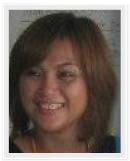 I did not know clearly about YMCA before the commence-ment of APAY International Work Camp. Making friends and meeting youth from Asia and Pacific who are always ready to share their YMCA sto-ries, has been a good memory for me. Their encouragement helped me to get to know more and get involved in YMCA in Surabaya. With the spirit, support and input from all friends here, in Indonesia and APAY, I hope we can follow through our expectations for YMCA Youth Club Su-rabaya, when we started to take the time and thought. I did not know clearly about YMCA before the commence-ment of APAY International Work Camp. Making friends and meeting youth from Asia and Pacific who are always ready to share their YMCA sto-ries, has been a good memory for me. Their encouragement helped me to get to know more and get involved in YMCA in Surabaya. With the spirit, support and input from all friends here, in Indonesia and APAY, I hope we can follow through our expectations for YMCA Youth Club Su-rabaya, when we started to take the time and thought.
Fransisca Grace (Surabaya, Indonesia)
The 100th Anniversaries of the YMCAs in China

It was 1912 when the National Committee of YMCAs was established in China. The YMCA activities were suspended during the time of Cultural Revolution starting 1966 till early 1980s. During the Cultural Revolution, many buildings and properties of the YMCAs then were used for some other purposes. After the policy shift of the government in 1980s, the Government had returned the properties to the YMCAs gradually. There are 10 local YMCAs at present active in China.
Most of the Chinese YMCAs (10 Local YMCAs) have reached its 100th anniversary. The oldest one was Tianjin (1897), Shanghai (1900), Guangzhou and Beijing (1909), Chengdu (1910), Wuhan (1911), and Xiamen, Nanjing and National Council (1912), Xian and Hangzhou (1914). The YMCAs of Xiamen, Nanjing and the National Committee have celebrated the 100th Anniversary during the 17 – 23 October 2012.
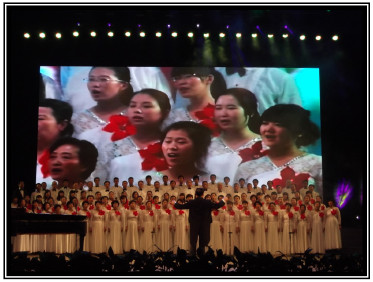 The National Convention in China took place this year, which has been held after 1930. A new Board of Directors has been elected, representing the voice of the existing local YMCAs. During the convention, Mr. Tu has been appointed as the new National General Secretary. Mr Tu, is the former General Secretary of the Wuhan YMCA. The National Convention in China took place this year, which has been held after 1930. A new Board of Directors has been elected, representing the voice of the existing local YMCAs. During the convention, Mr. Tu has been appointed as the new National General Secretary. Mr Tu, is the former General Secretary of the Wuhan YMCA.
The economic development of the country has shown a strong upward mobility in the whole nation especially in those ten cities with YMCAs. The economic growth and expansion of the cities have required more services and trainings for the young people as well as introduc-ing Christian values and International relationship buildings. Therefore the demands of the programs offered by the YMCA in China have been increased rapidly. Accordingly, the YMCA movements have gained much recognition from society.
In Nanjing, the YMCA has been developed according to the unique social context of the time. Issues facing the area has increased the demand for cultural learning and also introducing volunteerism. The demands for comprehensive and quality care for the elderly and physically and mentally handicapped have been responded by the YMCA there. The same thing can be said in the case of Xiamen. In addition, the Xiamen YMCA, due to its geographical condition of being close to Taiwan and other East Asian countries, the cultural exchange programs have been their unique contribution among YMCAs in the East Asia especially China, Hong Kong and Taiwan. Music activities of YMCAs in this area have been very active. They have conducted quite a number of joint concerts in the last six years. During the centenary celebrations 10 groups for musical performers from neighboring YMCA movements, Hong Kong Chinese Y and 3 YMCAs from Taiwan participated at the celebrations. Their high quality performance drew a lot of attractions and this was their 6th concert together.
The anniversary celebrations were held with attendance of local dignitaries and with many delegates from various overseas fraternal YMCAs. This depicts the close and warm relationship and network with the local and national religious bureau. The government sponsored the banquets for all the guests in each of the three places.
KOHEI YAMADA
Resource Mobilization Workshops
October 2012
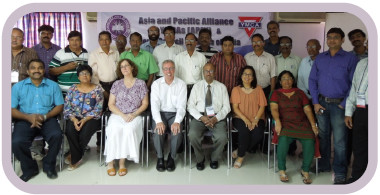
The first workshop on Resource Mobilization for North India YMCAs was held on 2-4 October in YMCA of Pune, India. The opening program was attended by key leaders of the National Council of the YMCAs of India and the local YMCA of Pune. There were ten (10) local YMCAs with about 38 partici-pants present. In his opening statement, Mr. Ron Coulombe said that “Resource Mobilization is not an easy task; it takes time because we are first develop-ing a spirit of philanthropy with the Board and staff and then overtime developing a culture of philanthropy, a culture of giving in our YMCA”.
With the set program/agenda, the consultants and resource persons, Mr. Ron Coulombe and Ms. Brenda Blakovich, facilitated and processed with the participants the learning components including their responses to questions about ‘what’s in their heart for the YMCA; their hopes and fears on resource mobilization; inputs on principles and concepts to develop a spirit of philanthropy; spirituality of asking/giving; case development with exercises; ‘goals presentation as the campaign focus rather than money’, choosing campaign name; lay and staff roles; identifying leaders; who to ask from and who will be the askers, identifying donors, more exercises on each of these components and the actual feel after the ask and the joy of giving and asking. Towards the end of the workshop, the respective local YMCAs set their goal at 32 Lakhs and 58,000 rupees or Rs 3,258,000. During the first annual campaign held in the morning of 4th October, a total amount of Rs315,100 was raised through pledges and commitments by the participants including their Board members and other YMCA staff and members present. The campaign period for this part of India will be 4th October 2012 to 4th February 2013. The initial campaign tag chosen was: “YMCA, You Change Lives Campaign”. However, since this will be a nationally coordinated campaign, this may change depending on how the other areas will develop their campaign title.
In Trivandrum, Kerala for the South India group of YMCAs, the workshop was held on 6-8 October in YMCA of Trivandrum (Thiruvananthapuram), Kerala. There were 42 participants from ten (10) local YMCAs including the resource persons and APAY staff. The team of resource persons, Mr. Ron Coulombe, Ms. Jamie Inman and Ms. Eloisa Borreo, had a consultation and shared their reflections from the initial workshop experiences. The inspiration and encouragement from the first workshop was a good thing to build upon to improve the next one. The team agreed to try some new strategies to stimulate participants’ sharing on what’s in his/her heart for the YMCA. They have written down and discussed with their respective groups their responses at the round table. The participants shared their successes and challenges from their past resource mobilization experiences in their YMCAs. They identified and shared their cases and developed their campaign title: “Share 4 Change” with four (4) sub-headings identified as: Empowering Youth; Health & Healthy Living; Gender Justice and Sustainable Development. The total goal was set at Rs 7,350,000 and the campaign launch raised a total amount of Rs 1,767,000 with other gifts from donors reaching $3,485. The campaign period will also last for four (4) months. Both of these areas identified their local leaders to be trained and made part of the year 2 workshop, after which the trained leaders will train other local leaders. The volunteer consultants/resource persons committed to closely work with respective leaders and the local YMCAs to further develop their cases, set up the campaigns infrastructure including the forms and other paper works on how to receive, record, report and thank the volunteers, donors and partners and fund stewardship. These are the keys to a successful resource mobilization and fund raising campaigns.
The third workshop in the series of three in 2 weeks’ time was with the National Council of YMCAs of Sri Lanka held at the International YMCA Hotel and training center in Negombo. With another volunteer consultant and resource person, Ms. Jessica Rawn, from YMCA of Simcoe/Muskoka, Canada and Mr. Ron Coulombe, also a volunteer Consultant on Resource Mobilization Program of the Asia and Pacific Alliance of YMCAs for the quadrennial, this workshop was attended by 25 participants from three (3) local YMCAs and the National Council.
In the introductory remarks, it was stated that Resource Mobilization is not just about money but also about developing relationships; positioning our YMCAs to do its mission in the communities it works with. Jessica’s introduction and sharing was effective in stimulating the participants and helping them expressed what’s in their heart for their YMCAs. Since there were only 25 participants and enough time, each one had a turn to express what’s in her/his heart for his/her YMCA. After inputs, discussion and exercises and more practice, this group identified their campaign title as “Help to Helpless” and their campaign goal was set at Rs 688,500. The total amount raised during the campaign launch was Rs338,900 and the campaign period will end by February 14, 2013.
As we shared and reflected at the end of this last workshop, the resource persons/consultants and the participants seemed to blend naturally in their respective areas. All the visits were very helpful not only in understanding each YMCA and their programs but also in establishing relationships with local leaders, staff and members.
ELOISA BORREO
Our Involvement in Social Economy
Social Economy is considered as an alternative economic system when the market economy has totally failed to bring economic emancipation for the people in modern days. The outcome from the Bretton Wood Institutions formed in the last century after the WW2 never brought good news for the mass people of the countries of the South. The market economy dwelt on the values of profitability only, made the world divided between the rich and the poor and the gap ever widening. The recent economic recessions in US and Europe lead to untold suffering of the people and the bailout procedures only helped the financial institutions earn more while leaving the vast majority of the mass people in deprivation.
In such a situation there is a need for an alternative way to nurture the economy, based on the values of cooperation, mutual respect, social entrepreneurship and social welfare. The social economy, is termed as ‘third sector’ and ‘non-profit sector’, refers to the various organizations between the state and the market, fulfilling both economic and social welfare objectives. The organizations include associations, traditional co-operatives, social co-operatives, charities, foundations and other types of organizations. These organizations usually do not distribute the profit but invests those again for cumulative effects of their missions. Volunteerism is the key human resource of social economy. The decision making bodies of these organizations are generally comprised of volunteers. Historically it has been observed that when people are economically depressed, they unite in solidarity and form social enterprises for their mutual benefit. Such enterprises prevail both in the South as well in the North too.
Common Characteristics of Social Enterprises is that they promote solidarity and mutuality. These enterprises are established to serve a common need, run by the consumers themselves, not for profit but for providing better products and service at the most reasonable cost. The profits are re-invested for greater interest of the stake holders. Mutual respect is held high, as it runs on the rule of ‘one man, one vote’. The Board is directly accountable to the stake holders. The emergence of social enterprises has created space for social leadership and volunteerism.
The YMCA being a social and volunteer organization, can also be termed as a social enterprise, aimed towards the total holistic development of a human being. However, the area of the people’s economic development aspect is left mostly unexplored by the YMCAs. In such a situation there is an ample scope for the YMCAs to get more involved in social enterprises for the economic emancipation of the people. The necessity of respond-ing to the economic needs of the people is important for the well-being of the people. This matter was particularly felt at the APAY Leaders Roundtable held on December 2011 in Singapore, the Strategic Plan of the APAY was developed here and subsequently adopted at the Executive Committee Meetings held in March 2012. Social Economy has been incorporated in the Strategic Plan of APAY as a thrust sector for the present Quadrennial. Keeping these in mind, the Asia and Pacific Alliance of YMCAs is planning to hold a workshop on social economy with key members of the national movements during the month of May or June 2013 with the following objectives:
- To enhance the knowledge of Social Economy of participants.
- To visit model Social Enterprise initiatives to gain first-hand experience on Social Economy.
- To learn about the best practices of the YMCAs involvement in Social Economy and also other NGOs leading in this field.
- To examine the possibility of YMCAs increased involvement in Social Economy.
- To develop a framework for APAY’s further involvement in Social Economy.
The National Movements shall be invited to send participants for the workshop. Around 25 Key Lay and Professional Leaders of both National or Local Level are expected to be participants of the workshop.
The YMCAs of Korea have been effectively engaged in promoting Social Entrepreneurship Programs and gained much expertise in this field, as such it would be appropriate for us to hold the program in Korea. This would enhance the effectiveness of the workshop, enriched with the Korean YMCA experience in Social Entrepreneurship. The duration of the workshop would be for 5 days. We hope that this workshop will be an entry-point for the YMCAs of our region to get involved in promoting Social Entrepreneurship and which we shall enhance our endeavor in the economic emancipation of our people.
DUNCAN CHOWDHURY
ICF Holds Human Rights Workshop in Indonesia
Six alumni of the School of Peace (SOP) from Cambodia, the Philippines and the host country of Indonesia took part in a human rights workshop conducted by Interfaith Cooperation Forum (ICF) from Sept. 23 to 29 in Jakarta. The workshop sought to provide the participants with more knowledge about human rights and to prepare them to be resource people on this issue for future ICF programs at the regional, subregional and national levels.
During the workshop, the participants discussed definitions of human rights, its historical development, the impact of culture on people’s rights, obstacles that hinder respect for people’s rights, the creation of a human rights culture and ways to document human rights violations and how ICF Holds Human Rights Workshop in Indonesia to use this documentation to protect people’s rights.
The overall focus of the workshop, however, was viewing human rights from a legal perspective through the U.N. human rights system. Consequently, the participants examined the Universal Declaration of Human Rights (UDHR) and several U.N. international human rights treaties on civil and political rights, economic, social and cultural rights and torture.
To further prepare the participants to be resource people on the issue of human rights, a follow-up workshop will be held early next year at which additional input will be made on the U.N. conventions related to the rights of women and children and the influence of corruption on human rights. However, the main thrust of the next program will be to look at human rights from a moral or faith-based perspective.
ICF Holds Working Committee Meeting in Indonesia
The annual meeting of the Interfaith Cooperation Forum (ICF) working committee was held from Oct. 1 to 4 in Vientiane, Laos. The working committee members were joined by the ICF staff and the general secretaries of APAY and CCA, the two project holders of ICF.
The group reviewed ICF’s work for the past year, including the 14-week School of Peace (SOP) held in Bangalore, India, between February and May this year and a series of workshops that began in September to prepare some of the SOP alumni to be resource people on the topics of community organizing and human rights for future ICF programs. A third workshop on tools for transformation - the use of art, drama and music for education and advocacy - will be held in December in Siem Reap, Cambodia. In addition, the group heard about a workshop - also in Siem Reap - from Oct. 20 to 26 at which members of various indigenous communities in Asia will discuss peace, justice and the environment from the perspective of their spirituality, traditions and practices with the eventual outcome being publication of a book to share their insights and wisdom.
After this review and evaluation of ICF’s past work and a discussion about the vision of ICF’s activities in 2015, the group focused its attention on future programs for the next one to two years. As well as holding follow-up workshops in community organizing, human rights and tools for transformation and another program on indigenous spirituality and justpeace next year, it was decided to organize a workshop for justpeace education for children in February 2013 and a trauma healing workshop in October of that year.
The most significant decision, however, was to hold a subregional SOP for South Asia in Sri Lanka in the middle of the year. This decision was part of a major shift by the working committee to focus much of the attention of ICF for the foreseeable future on activities at the subregional level rather than for the whole region as was the practice in the past with its 14-week SOP in Bangalore, India. Following this new direction, the working committee also decided to conduct a second subregional SOP in 2014 with the details to be determined later.
Regarding ICF’s national movements, a meeting of ICF’s national coordinators in Cambodia, Indonesia, Nepal, the Philippines and Thailand/Burma will be held in January 2013 to discuss their roles as every movement will select a new national coordinator by the end of 2012. Max Ediger, the ICF coordinator, also shared with the group that a new national interfaith movement will soon be created in Laos as they now have a core group of five SOP alumni from the program in Bangalore. Moreover, the SOP alumni in Burma will soon form their own national movement after being part of the movement in Thailand for the past two years. Ediger said that he expects other national movements to be set up in the next few years in Bangladesh, East Timor and Vietnam.
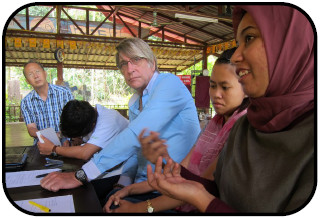
1. Elizarni, an ICF working committee member from Aceh in Indonesia, right, shares her thoughts with the group that includes Halima Abdullah from the Philippines, second from right; ICF coordinator Max Ediger, center; and the general secretary of APAY, Kohei Yamada, left.
SOP Alumni Make Plans for Activities in Indonesia and East Timor
School of Peace (SOP) alumni in Indonesia and East Timor gathered in Jakarta for a two-day meeting beginning on Sept. 22 to review their work and issues of the past year and to make plans for the upcoming year as an interfaith movement for justpeace in their countries. Bruce Van Voorhis of Interfaith Cooperation Forum (ICF) in the APAY office in Hong Kong and Keo Vichith, a new ICF staff member in Cambodia and SOP alumni, also attended the meeting that brought together SOP alumni from Aceh, Bandung, Surabaya, Poso and Papua as well as Jakarta and Dili in East Timor.
The SOP alumni decided that as part of a 16-day campaign in Aceh opposing violence against women between Nov. 25 and Dec. 10 this year that they will hold a one-day Festival of Justpeace at which they will offer a workshop on women and pluralism, screen films, provide food for peace and share village folk stories.
The SOP alumni in Bandung explained to the group about the growing Islamic fundamentalist trends among the people and youth in West Java. As an initial response to this phenomenon, she invited some of the Indonesian alumni to take part in an afternoon coffee forum she will host between November and January to talk about SOP in order to gauge the reaction of the others at the forum.
In Central Sulawesi, the two SOP alumni in Poso offered to conduct an interfaith workshop with the Mosintuwu Institute, a women’s group in Tentena, for youth from a pesantren in Poso and a Christian seminary in Tentena as a first step toward forming an Interfaith Youth School. Other SOP alumni were invited to be resource people for this program.
While no concrete plans were made for activities in Papua and East Timor, the two SOP alumni in Papua said that they would begin building relationships with indigenous youth and learn about their issues, and the SOP alumni in East Timor indicated that he would like to plan an activity through his new role as a staff member of the YMCA in Dili.
The SOP alumni at the planning meeting also indicated their desire to expand their interfaith network to Kalimantan, East Nusa Tenggara and Ambon in the Maluku Islands.
Prior to the meeting in Jakarta, Bruce and Vichith visited the two SOP alumni in Poso to gain a better understanding of their work with World Vision with people internally displaced by the violence between Christians and Muslims more than a decade ago and through the programs of Care Community for Women and Children, known by the Indonesian acronym KPPA - the Women’s Political School and Banua Ananggodi, or House of Children.
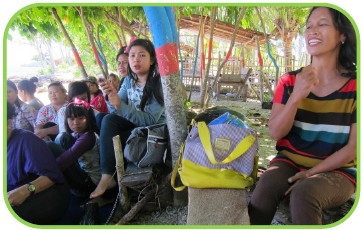 Members of the Women’s Political School in Poso on the Indonesian island of Sulawesi explain what they have gained from this program of KPPA, a program whose curriculum includes women’s rights, public speaking, domestic violence and public policy advocacy. Members of the Women’s Political School in Poso on the Indonesian island of Sulawesi explain what they have gained from this program of KPPA, a program whose curriculum includes women’s rights, public speaking, domestic violence and public policy advocacy.
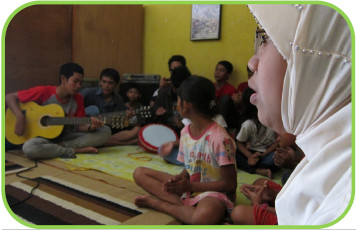 Banua Ananggodi, or House of Children, is an interfaith program of KPPA in Poso that brings together children of different religious and ethnic backgrounds between the ages of 7 and 17 for a variety of activities under the themes of humanism, pluralism, gender equality and environmental protection. Since 2010, more than 400 children have taken part in the program. Banua Ananggodi, or House of Children, is an interfaith program of KPPA in Poso that brings together children of different religious and ethnic backgrounds between the ages of 7 and 17 for a variety of activities under the themes of humanism, pluralism, gender equality and environmental protection. Since 2010, more than 400 children have taken part in the program.
 YMCAs from all over the world celebrated a basketball shooting event on 13 October, 2012. We are sharing some pictures of some move-ments in our region. We congratulate to all movements who have organized the events well and actively participated in the events. YMCAs from all over the world celebrated a basketball shooting event on 13 October, 2012. We are sharing some pictures of some move-ments in our region. We congratulate to all movements who have organized the events well and actively participated in the events.
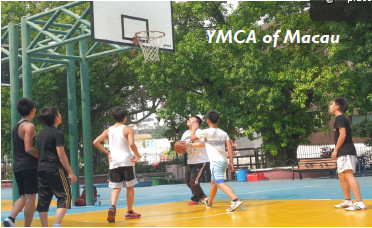 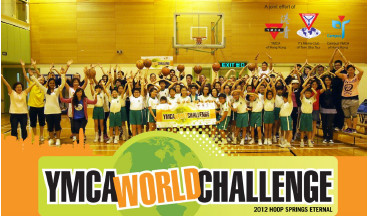
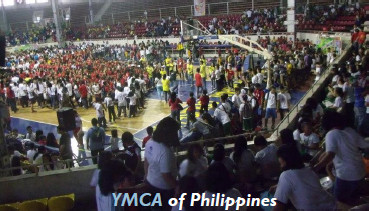 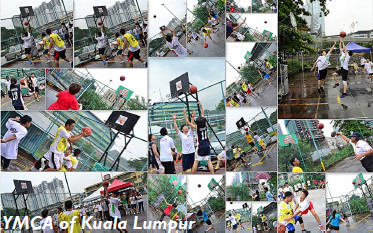
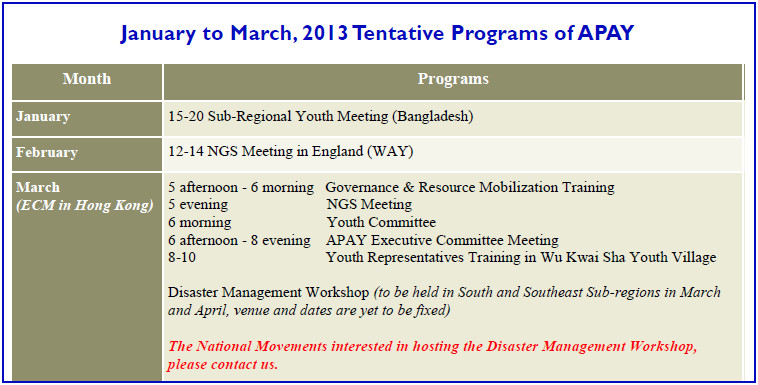
|
